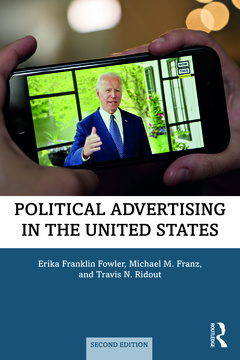Political Advertising in the United States (2nd Ed.)
Auteurs : Franklin Fowler Erika, Franz Michael, Ridout Travis

Political Advertising in the United States examines the volume, distribution, content, and effects of political advertising in congressional and presidential elections. The book considers the role of television ads using extensive data on ad airings on local broadcast stations. It also analyzes newly available data on paid digital ads, including ads on Facebook, Instagram, Google, and YouTube. The book covers the role of outside groups in airing ads, including the rise of dark money groups and gaps in existing federal campaign finance laws around transparency of outside group spending. The authors consider how ad sponsors design and target ads. They also review the positive and negative implications of an electoral system where billions are spent on paid advertising. With detailed analysis of presidential and congressional campaign ads and discussion questions in each chapter, this accessibly written book is a must-read for students, scholars, and practitioners who want to understand the ins and outs of political advertising.
New to the Second Edition
? Covers the spending, content, and tone of political advertising in the 2016 and 2020 presidential elections and the 2018 midterms, looking ahead to 2022 and 2024.
? Addresses the interference of foreign actors in elections and their connection to political advertising.
? Expands the discussion of digital political advertising and incorporates this topic into every chapter.
? Adds a new chapter specifically addressing digital ad content and spending.
? Includes data from the Facebook, Google, and Snapchat ad libraries and explores the role of these companies in regulating the sale of political advertising.
? Incorporates new data on the effects of race and gender in advertising, including what is known about the way in which advertising may activate prejudicial attitudes.
List of Illustrations
Preface
1 Introduction
Why Study Political Advertising?
Four Key Arguments
History of Campaign Advertising
Tracking Advertising
Plan of the Book
Discussion Questions
Notes
2 The Regulation of Advertising
The Rules of Campaign Financing
The Impact of the Rules
Conclusion
Discussion Questions
Notes
3 The Volume and Content of Political Advertising on Television
Volume of Television Advertising
Tone of Television Advertising
Issues in Television Advertising
Conclusion
Discussion Questions
Notes
4 The Challenge of Online Advertising
What is Digital Advertising?
Digital Ad Spending in 2020
What Digital Advertising Looks Like
Understanding the Online Ad Landscape
The Bad and Good of Online Advertising
Conclusion
Discussion Questions
Notes
5 How Ads Are Created and Tested
The Elements of a Political Ad
Making the Ad
Conclusion
Discussion Questions
Notes
6 Buying and Targeting Political Advertising on Television
Buying Decisions
Outlets for Political Advertising
Targeting Political Advertising
The Changing Media Landscape and Its Effect on Voters
Examining Ad Targeting Through Ad Airings and Media Consumption Data
Conclusion
Discussion Questions
Notes
7 Studying the Persuasive Effects of Advertising
The History of Media Influence Research and Current Challenges
What We Know About Advertising’s Ability to Persuade
How Do We Know What We Know? The Importance of Research Design
Conclusion
Discussion Questions
Notes
8 Beyond Persuasion: Mobilization and Other Effects of Advertising
Does Advertising Influence Our Political Participation?
What Do We Learn from Advertising?
Do We Accurately Perceive Advertising and Campaign Tone?
Does Advertising Affect Our Trust in the Political System?
Does Advertising Affect Our Health as a Society or Reflect a Just and Equal Society? The Darker Side of Campaign Appeals
Conclusion
Discussion Questions
Notes
9 The Future of Political Advertising and Its Role in Our Society
Technological Change
Changes in Regulation
Broader Impacts of Political Advertising
Conclusion
Discussion Questions
Notes
Glossary
Index
Erika Franklin Fowler is Professor of Government at Wesleyan University and co-director of the Wesleyan Media Project.
Michael Franz is Professor of Government and Legal Studies at Bowdoin College and co-director of the Wesleyan Media Project.
Travis N. Ridout is Thomas S. Foley Distinguished Professor of Government and Public Policy and Director of the School of Politics, Philosophy and Public Affairs at Washington State University and is co-director of the Wesleyan Media Project.
Date de parution : 11-2021
15.2x22.9 cm
Date de parution : 11-2021
15.2x22.9 cm
Thèmes de Political Advertising in the United States :
Mots-clés :
Air Ads; sponsored; Political Advertising; negative; Political Ads; ads; Ad Sponsors; wmp; Digital Advertising; wisconsin; Negative Ads; project; Wesleyan Media Project; interest; Fec; groups; Digital Ads; air; Senate Race; senate; Lowest Unit Rate; Michael M; Franz; Ad Spending; Travis N; Ridout; Online Ad; Wisconsin Advertising Project; Local Broadcast Television; Dark Money; Joe Biden; Negative Advertising; Contrast Ads; Positive Ads; Trump Campaign; Super PAC; Digital Ad Spending; Ad Effects; Ad Targeting



